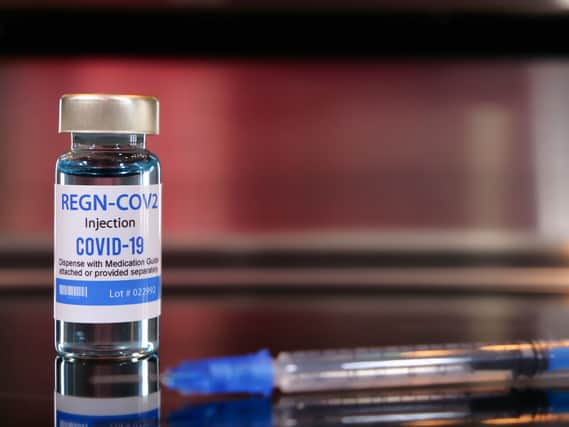New Covid antibody drug found to prevent 100% of symptomatic infections in NHS trials


A new Covid-19 drug has been found to prevent 100 per cent of symptomatic infections during trials carried out by the NHS.
The promising results suggest that the experimental antibody cocktail, developed by Regeneron Pharmaceuticals Inc, could be used as a “passive vaccine” to block coronavirus.
Reduced overall infections
Advertisement
Hide AdAdvertisement
Hide AdPatients who took part in the trial, run with the National Institute of Allergy and Infectious Diseases (NIAID), were injected with the antibody cocktail, called REGEN-COV, which is made up of lab-enhanced antibodies that are designed to mimic how the body would respond to an invading virus.
The drug was administered to people who had been exposed to coronavirus from someone in their household, with the trial showing that the antibodies stopped symptomatic cases entirely.
Results also found that the drug reduced overall infections by 50 per cent in the first week after exposure, while scientists also reported that it significantly reduced the length of illness in infected people.
Phase three results from the trial are expected early in the second quarter of this year.
Antibody treatment 'could provide immediate passive immunity'
Advertisement
Hide AdAdvertisement
Hide AdGeorge D Yancopoulos, president and chief scientific officer at Regeneron, said: “Even with the emerging availability of active vaccines, we continue to see hundreds of thousands of people infected daily, actively spreading the virus to their close contacts.
“The REGEN-COV antibody cocktail may be able to help break this chain by providing immediate passive immunity to those at high risk of infection, in contrast to active vaccines which take weeks to provide protection.”
Dr Penny Ward, chair of the Education and Standards Committee of the Faculty of Pharmaceutical Medicine, explained that while vaccinations will prevent disease, they take around 14 to 21 days to take effect.
She said: “In an immediate contact situation, this is too long to prevent illness which may, in an individual at high risk, be fatal.
Advertisement
Hide AdAdvertisement
Hide Ad“This approach could protect patients receiving chemotherapy for cancer, enable control and prevention of outbreaks in an institutional setting, and reduce pressure on health services."
Further treatments in development
The results of the trial come as another clinical study is being launched to see whether two Covid-19 antibody treatments could be combined to improve patient outcomes.
British drugs firm GlaxoSmithKline (GSK) and clinical-stage immunology company Vir Biotechnology’s treatment, known as VIR-7831, will be given to low-risk patients with mild to moderate Covid-19 alongside bamlanivimab, developed by US pharmaceutical company Lilly.
Both VIR-7831 and bamlanivimab are monoclonal antibodies – man-made proteins that act like natural human antibodies in the immune system.
Advertisement
Hide AdAdvertisement
Hide AdThe researchers will also examine whether the combined treatment can increase a patient’s resistance to existing and new variants.
Bamlanivimab is already approved for emergency use in the treatment of Covid-19 in the US, while VIR-7831 is in phase three clinical studies with initial results expected in the first quarter of 2021.
Trials for the combination therapy are due to take place in the US and Puerto Rico.
Dr Hal Barron, chief scientific officer at GSK, said: “Despite the significant progress on vaccines, there remains an urgent patient need for multiple therapeutic approaches to help prevent the severe consequences of Covid-19.
Advertisement
Hide AdAdvertisement
Hide Ad“Partnering with Lilly to study VIR-7831 with bamlanivimab will provide the scientific community with further data on the important role these therapies could play in reducing the impact of this devastating pandemic.”
The study comes as NHS England boss Sir Simon Stevens told MPs on Tuesday (26 Jan) that he believes coronavirus could become a “much more treatable disease” over the course of the next six to 18 months as more Covid-19 treatments become available.